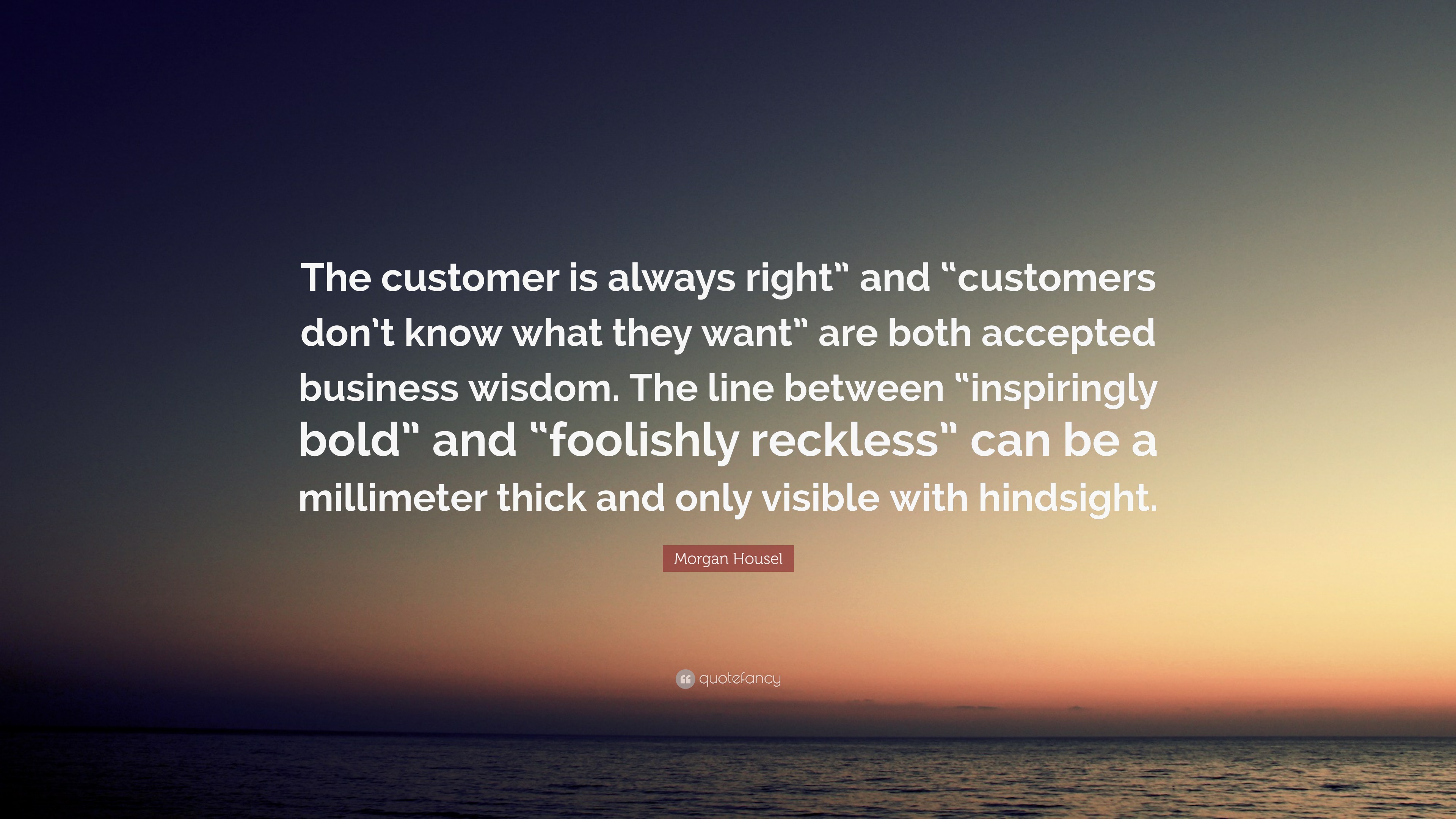The Customer Is Always Right In Matters Of Taste Meaning

The venerable adage, "The customer is always right," a cornerstone of retail and service industries for over a century, is facing unprecedented scrutiny. While its intent – prioritizing customer satisfaction – remains laudable, its literal interpretation is increasingly contested in a world shaped by readily available data, vocal online communities, and evolving business models.
At the heart of this debate lies a fundamental question: Does unwavering deference to customer preferences, especially regarding subjective matters of taste, ultimately benefit businesses and consumers alike? This article delves into the nuances of this principle, exploring its origins, its modern applications, and the growing chorus of voices questioning its absolute validity. We will examine how data-driven insights, employee well-being, and brand integrity are challenging the traditional understanding of customer service.
The Historical Roots of a Customer-Centric Philosophy
The phrase "The customer is always right" is often attributed to either Harry Gordon Selfridge, the founder of Selfridges department store in London, or César Ritz, the legendary hotelier. Regardless of its precise origin, the sentiment reflects a burgeoning recognition in the late 19th and early 20th centuries that customer satisfaction was paramount for business success.
Early iterations of this philosophy emphasized providing exceptional service and resolving complaints effectively. This approach fostered customer loyalty and positive word-of-mouth, invaluable assets in an era before widespread advertising and online reviews.
The Modern Interpretation: Beyond Taste and Preference
Today, the customer-centric model extends far beyond simply agreeing with every subjective preference. Businesses now leverage data analytics to understand customer behavior, predict future needs, and personalize experiences. This involves analyzing purchase history, website browsing patterns, and social media interactions to create tailored offerings.
However, the application of this principle to matters of taste is where the waters become muddied. Should a restaurant fundamentally alter its menu based on a few negative reviews from customers who simply don't appreciate the chef's culinary vision? Or should a fashion designer abandon a groundbreaking collection because it doesn't align with mainstream trends?
Challenging the Dogma: When "Right" Becomes Wrong
Several factors are contributing to the re-evaluation of the "customer is always right" mantra. Firstly, the rise of online review platforms has amplified the potential for both constructive feedback and malicious or misinformed criticisms. A single disgruntled customer can now inflict significant reputational damage, regardless of the validity of their claims.
Secondly, a growing emphasis on employee well-being is prompting businesses to prioritize the safety and respect of their staff. This includes protecting employees from abusive or unreasonable customer behavior, even if it means potentially losing a sale.
"We empower our employees to make decisions that are in the best interest of both the customer and the company, but we also expect them to be treated with respect,"stated a spokesperson for a national retail chain in response to questions about their customer service policies.
Finally, brands are increasingly recognizing the importance of staying true to their core values and maintaining their unique identity. Succumbing to every customer whim can lead to homogenization and a loss of authenticity, ultimately eroding brand loyalty in the long run.
The Role of Data and Analytics
Data provides valuable insights into customer preferences, but it shouldn't be the sole determinant of business decisions. For instance, sales data might indicate a decline in popularity for a particular product, but that doesn't necessarily mean it should be discontinued. Perhaps a targeted marketing campaign or a slight modification could revitalize its appeal.
Furthermore, data can be used to identify emerging trends and unmet needs, allowing businesses to innovate and create new products and services that genuinely enhance the customer experience. The key is to use data as a tool for understanding, not as a rigid mandate.
The Importance of Employee Empowerment
Empowering employees to exercise their judgment and make decisions based on their expertise is crucial. Frontline staff often have a deeper understanding of customer needs and preferences than management. They can provide valuable insights and offer tailored solutions that generic policies might overlook.
However, this empowerment must be accompanied by clear guidelines and training on how to handle difficult situations and resolve conflicts effectively. Employees need to feel supported and protected when dealing with challenging customers.
Finding the Balance: A Customer-Centric Approach with Boundaries
The future of customer service lies in finding a balance between prioritizing customer satisfaction and upholding brand integrity, employee well-being, and ethical business practices. This requires a nuanced understanding of the "customer is always right" principle and a willingness to challenge its literal interpretation.
Instead of blindly adhering to every customer demand, businesses should focus on actively listening to feedback, providing exceptional service, and resolving legitimate complaints fairly and efficiently. This approach fosters trust and builds long-term relationships, which are far more valuable than simply placating every customer at any cost.
Ultimately, the goal is not to make the customer "right" in every instance, but to make them feel heard, valued, and respected. This requires empathy, understanding, and a genuine commitment to providing a positive experience, even when disagreements arise.
Looking Ahead: The Evolving Landscape of Customer Service
As technology continues to advance and customer expectations continue to evolve, the relationship between businesses and consumers will inevitably undergo further transformation. Artificial intelligence, chatbots, and personalized marketing will play an increasingly prominent role in shaping the customer experience.
However, the fundamental principles of empathy, integrity, and respect will remain essential for building strong and lasting customer relationships. The businesses that succeed in the future will be those that can adapt to these changes while staying true to their core values and prioritizing the well-being of both their customers and their employees.










![The Customer Is Always Right In Matters Of Taste Meaning DURATION QUOTES [PAGE - 10] | A-Z Quotes](https://www.azquotes.com/picture-quotes/quote-the-customer-is-always-right-may-have-become-a-standard-motto-in-the-world-of-business-max-atkinson-68-8-0811.jpg)







